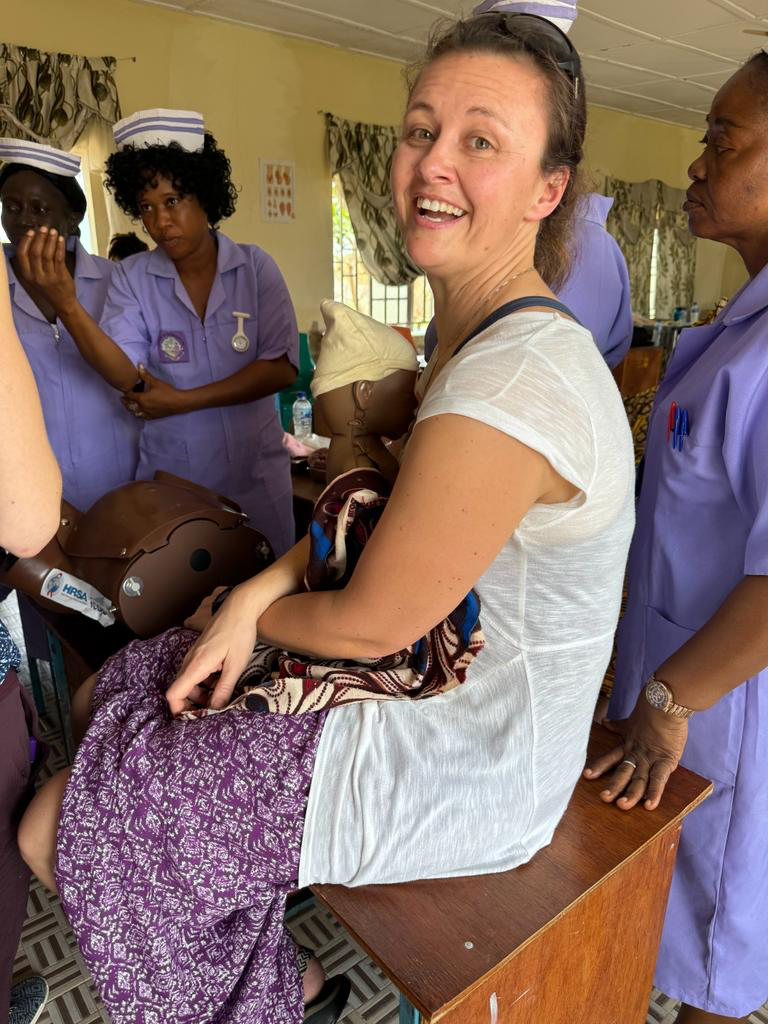Betty Tenga’s Triumphant Return to West Africa
On the 13th of January, 2024, five nurses from the Canmore General Hospital left Canada for Sierra Leone, West Arica. Under the capable leadership of Betty Tenga, Kari Mason, Susie VanBoom, Liz Demers and Jasper VanMaanen spent two weeks participating in a conference and training sessions for African nurses, midwives and other health professionals working in the areas of gynecology and obstetrics. All of these nurses went to Africa at their own expense to help upgrade the skills of local nurses and midwives in preventing maternal / newborn complications.
Originally from West Africa, Betty came to Canada as a political refugee from war-torn Sierra Leone in December of 2000. She arrived in Canmore with her husband and four children, and with the assistance of Bev and Paul Carrick, set up a new home for themselves in the Bow Valley. Betty then went on to become a full-time nurse at the Canmore General Hospital and quickly became a highly respected and dearly loved member of the hospital’s obstetrics team. It was not uncommon for women to come from outside of the Bow Valley requesting that Betty help deliver their babies.
In December of 2023, Betty retired from full-time nursing and resigned her position at the Canmore Hospital. However, she is not finished with selfless service.
Taking a team of nurses from Canmore to Sierra Leone has long been a burning ambition for Betty. The complementary objectives of sharing her love for Africa with her Canadian colleagues while simultaneously facilitating professional development activities for Sierra Leone nurses, midwives and public healthcare workers was a dream come true. To this end, Betty helped to organize a week of formal training for local healthcare providers, in partnership with the midwifery school of Njala University and the Bo General Hospital. And, each of the Canmore nurses played important roles in the teaching and hands-on training that Betty’s team provided.
Throughout the training, Betty’s team shared best birthing practises with approximately 110 Sierra Leonians at the week-long conference, participating with three live births, gave one-on-one training to 22 midwives and helped to up-grade the medical equipment in two village birthing clinics and two major hospitals.
While making a field trip to a rural birthing clinic, Betty’s team provided support to a woman enduring obstructed labour. It quickly became apparent to the Canmore nurses that if the woman was not immediately rushed to a hospital, both the mother and the baby would likely die. Unfortunately, as is all too often the case, an ambulance was not available. The team then carried the pregnant woman to the nearest hospital in their own vehicle and paid for the woman’s medical expenses. The mother survived and a healthy baby boy was successfully brought into the world. Although this particular crisis had a happy ending, the Canadians were haunted by the fact that if they had not been there, both mother and child would have perished. They were also deeply distraught by the dearth of medical equipment and supplies that rural birthing clinics have at their disposal. Furthermore, the scarcity of ambulances in the country is a tragic reality.
Although the Canmore nurses found their time in Africa to be most gratifying, it was both eye-opening and upsetting to observe the gross disparities in global healthcare. Nonetheless, each of them wants to return to Sierra Leone and once again enjoy the privilege of partnering with local nurses and midwives in improving maternal neo-natal healthcare.
Betty Tenga would also like to return to her homeland with Canadian nurses and support on-going skills training for her African colleagues. As a matter of fact, Betty would like to do this at least once every year. And the Canmore-based charity that supported Betty and her team of nurses on this recent trip, the Embrace International Foundation (Embrace), would also like to support Betty in her desire to continue in the sharing of best birthing practises with rural midwives in West Africa. Planning is already underway for a return trip in 2025.



